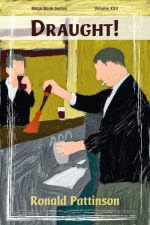 Ideas. Something I'm rarely short of. Sometimes they even develop as far as plans. One plan I've been kicking around for several years is to write about Amsterdam's jenever culture. Not liking to do things by halves, it would not just list the city's jenever bars but describe jenever, its varieties, its history, its producers.
Ideas. Something I'm rarely short of. Sometimes they even develop as far as plans. One plan I've been kicking around for several years is to write about Amsterdam's jenever culture. Not liking to do things by halves, it would not just list the city's jenever bars but describe jenever, its varieties, its history, its producers.Why has this plan never come to fruition? You have to ask? Because I'm too effing busy already. But there is someone just as passionate as me about quality jenever: Mike. The solution is obvious. Mike will write about jenever for me. After all, he was a professional journalist "Jenever!" could well be volume 12 of my Mini Book Series.
Reason number two. Recent conversations about jenever. With Gary Gillman, one of my regular readers, and his nephew Alan. They've just got me thinking about jenever.
The last reason is more straightforward. This passage about gin came directly after one about beer. As I've said so often before: I'm easily distracted.
[The following passage is taken from "Food and its adulterations" by Arthur Hill Hassall, published 1855, pages 634-635.]
GIN, AND ITS ADULTERATIONS.
Gin was made originally in Holland, in the distilleries of Schiedam, and hence that which is brought to this country is termed Hollands Gin. At one time, when the duty was low, it used to be largely imported, but owing to the high rate of duty levied upon it for some years past, which was, until 1840, £1 2s. 10d. per imperial gallon, and since that period has remained at 15s,— but little now reaches this country.
In Holland it is made solely from unmalted rye and barley-malt, rectified with juniper berries. In Britain, gin is for the most part obtained from a mixture of malt and barley, molasses and corn being sometimes employed, particularly when there is a scarcity of grain, and it is usually flavoured not only with juniper berries, but with certain other substances, most of which are aromatics, and amongst which are the following: coriander, cardamom, and caraway seeds, grains of paradise, angelica root, calamus root, crushed almond cake, liquorice powder, and orange-peel. These ingredients, variously combined, form what are known in the trade as "gin-flavouring."
In Dr. Muspratt's "Chemistry, Theoretical, Practical, and Analytical," the following receipts from the note-book of an extensive distilling rectifier are given.
"For a Fine Gin, take
960 gallons of spirit, hydrometer proof.
96 lbs. German juniper berries
6 lbs. coriander seeds.
4 lbs. grains of paradise.
4 lbs. angelica root.
2 lbs. orris root.
2 lbs. calamus root.
2 lbs. orange peel.
Eighty or ninety pounds of liquorice powder are occasionally added to impart colour and sweetness.
 Plain or London Gin is made as follows : —
Plain or London Gin is made as follows : —700 gallons of the second rectification.
70 lbs. German juniper berries.
70 lbs. coriander seeds.
3.25 lbs. almond cake.
1.5 lbs. angelica root.
6 lbs. liquorice powder.
For the manufacture of West Country Gin, the annexed is the process given in Dr. Muspratt's work: — Introduce into the still 700 gallons of the second rectification, and flavour with —
14 lbs. German juniper berries,
1.5 lbs. calamus root, cut, and
8 lbs. sulphuric acid.
This gin is much used in Cornwall, and particularly in the western counties of England ; it is also used in making British Hollands, and in that case is mixed with about five per cent, of fine gin, reduced to twenty-two under-proof with liquor. Our own examination of this variety of gin, usually called Plymouth Gin, tends to show that it is little else than a moderately pure rectified spirit, unsweetened, containing fusel oil, and flavoured with a little juniper and acetic ether.
 For Geneva, charge of still being 930 gallons of second rectification the proportions are —
For Geneva, charge of still being 930 gallons of second rectification the proportions are —84 lbs. juniper berries.
112 lbs. coriander seeds.
6 lbs. cassia buds.
4 lbs. angelica root.
6 lbs. calamus root.
6 lbs. almond cake.
0.5 lb. cardamoms.
Plain Geneva.— For 950 gallons of spirit of second rectification, take
84 lbs. juniper berries.
84 lbs. coriander seeds.
2 lbs. almond cake.
2 lbs. orris root.
2 lbs. calamus.
Another prescription for making Geneva, and one which is much esteemed a the following : — Add to 950 gallons —
14 lbs. grey salts, and
4 lbs. white salts.
The rectification to be conducted with the usual care.
At the second operation, add —
168 lbs. juniper berries.
74 lbs. coriander seeds.
12 lbs. almond cake.
8 lbs. grains of paradise.
8 lbs. angelica root.
1 lb. cardamoms.
2 lbs. calamus."






































































7 comments:
Plymouth is the house gin in my pub.
Finally got into that bottle of Fillier's you gave me, Ron. We went to a friend's house over May Day weekend (they're musical types, and there was actually...Morris dancing going on). They're very much drinking folks, and while we were jumping into some beers, and some 25 year old Laphroaig I'd run into, I pulled out the Fillier's. It was the hit of the afternoon. MUCH more whisky than gin, at least on the palate; fat and creamy, just a bit of a spice spike, and eminently drinkable on its own in a glass. THANKS!
Ive seen a few Jenevers that have been aged on oak. Is this traditional?
In my experience, there is considerable variation regarding aging. Some producers age their jenever, or elements of them, to make up their blends, some do not. With Filliers (Belgian jenever) much of its character seems to comes from the casks used for aging, which perhaps are ex-sherry or madeira or brandy casks, or a combination. Oie in Holland does a 3 year rye-based jenever. Other types are not aged or not for very long. I get the sense each producer puts his own take on it. Same thing with the juniper berry, some producers use it in varying amounts, some do not. While associated historically to jenever gin, its use is not mandatory.
Gary
Lew, great stuff, isn't it, that Filliers? It's about as good as jenever gets.
Kristen, the best jenevers are all aged in small oak casks.
Jeff, I'll have to give the Plymouth Gin a try next time I'm in your pub.
Post a Comment